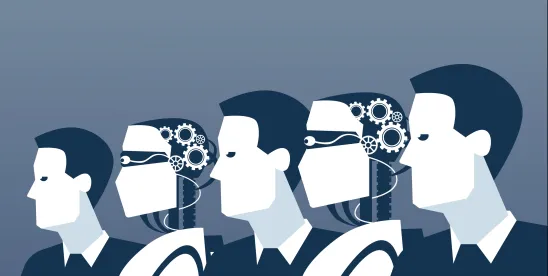Artificial intelligence (AI) has become a game-changer in the business world, helping to drive efficiencies, spark innovation and unlock new growth opportunities. According to PwC, AI could add a staggering $15.7 trillion to the global economy by 2030.
As more companies embrace AI technologies, the demand for AI-skilled employees is skyrocketing. McKinsey’s latest data shows a 21-fold increase in job postings mentioning AI technologies like “ChatGPT” since these tools were introduced, highlighting the rapid integration and growing need for AI skills. According to a report from Skillsoft, more than one-third of C-suite leaders identified cybersecurity and AI as top investment areas for training.
AI integration in U.S. immigration
Recognizing the growing field of AI and the need to capture these highly skilled workers for the U.S. workforce, the Biden administration issued an executive order highlighting the need for the U.S. to commit to the utilization of AI to promote innovation and competition within the global economy.
In addition, the Department of Homeland Security (DHS), including U.S. Citizenship and Immigration Services (USCIS), announced initiatives to incorporate AI into its operations. This shift in utilizing AI to enhance the efficiency of the department will allow companies to have access to faster governmental processing, along with more consistent and fair decision-making in hiring foreign workers.
The top industries impacted by AI
As AI continues to revolutionize how we work, the demand for AI expertise is on the rise across business sectors. According to the recent Future of Jobs Report by the World Economic Forum, here are the top industries with the highest demand for AI skills:
- The IT sector leads in AI job postings, driven by the need for advanced data analysis, cybersecurity and software development.
- Financial services. AI is used in the finance industry for tasks such as fraud detection, risk management, algorithmic trading and personalized financial services.
- The demand for AI professionals in healthcare is growing as AI technology is integrated into diagnostics, personalized treatment plans and administrative automation.
- AI helps retailers optimize supply chains, manage inventory, predict consumer behavior and enhance the overall shopping experience.
- This sector relies on AI to optimize production processes, improve operational efficiency, reduce costs and maintain high-quality standards.
Rethink hiring for the new AI age
As AI continues to reshape industries, HR managers face the critical task of preparing their workforce to thrive in this AI-driven future. Thought leaders like Andrew Ng, a prominent AI expert, emphasize the importance of education and training, stating, “AI is the new electricity. Just as electricity transformed every major industry a hundred years ago, AI will transform every major industry in the future.”
To help HR managers navigate this transformation, here are six proven strategies to effectively upskill your workforce for AI, including training and development programs, and tips for hiring foreign talent with AI expertise.
-
Identify skills gaps and future needs
Begin by assessing the skills of your current workforce and identifying gaps that need to be filled to support AI initiatives. Collaborate with department heads and AI specialists to pinpoint the specific AI-related skills required for your business.
Getting started:
- Conduct skills assessments and surveys
- Analyze future AI project requirements
- Create a skills inventory and gap analysis
-
Develop comprehensive training programs
Design training programs that cater to varying levels of AI knowledge and expertise within your organization. This can include foundational courses for beginners and advanced technical training for more experienced staff.
Getting started:
- Partner with educational institutions and online learning platforms
- Implement in-house training sessions and workshops
- Encourage participation in AI conferences and seminars
-
Promote a culture of continuous learning
Foster an environment where continuous learning is encouraged and valued. Providing ongoing support and resources for employees to expand their AI skills will help maintain their enthusiasm and commitment.
Getting started:
- Establish a learning management system (LMS) for easy access to training materials
- Offer incentives for completing AI courses and certifications
- Create AI-focused learning communities and forums
-
Leverage internal talent for knowledge sharing
Encourage employees who have acquired AI skills to share their knowledge with colleagues. This can be done through mentorship programs, internal workshops and collaborative projects.
Getting started:
- Implement a mentorship program pairing experienced AI professionals with learners
- Encourage teams to use new AI tools to solve day-to-day organizational challenges
- Facilitate cross-departmental collaboration on AI projects
-
Hire foreign talent with built-in AI expertise
Given the global nature of AI, hiring foreign workers already skilled in AI provides an immediate impact, complementing your upskilling strategy and ensuring that your organization can tackle complex projects from day one.
Getting started:
- Explore specialized recruiters, global job boards and professional networks
- Offer relocation assistance and support for work visas, permits and USCIS fees
- Partner with a law firm that specializes in immigration law to further streamline the employment authorization and visa process
-
Provide clear paths for career development
Outline clear career development pathways for employees specializing in AI. This motivates employees to upskill and helps retain top talent by offering them a vision for their future within the company.
Getting started:
- Create AI-specific career progression plans
- Regularly review and update development pathways
- Provide opportunities for leadership roles in AI projects
Embracing the future of work
Upskilling your workforce for AI is a first step that can propel your organization and open up new opportunities for efficiency, collaboration and growth. By identifying skills gaps, developing robust training programs and hiring experienced foreign workers, you can build a resilient and innovative workforce that’s ready to maximize the full potential of AI. As Andrew Ng aptly puts it, “The AI transformation is coming. Embrace it, and your organization will thrive.”




 />i
/>i

